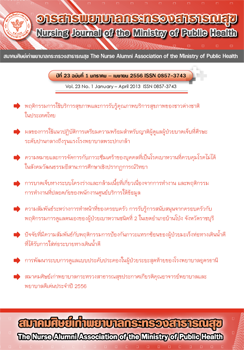ความหมายและการจัดการกับภาวะซึมเศร้าของบุคคลที่เป็นโรคเบาหวานที่ควบคุมโรคไม่ได้ ในสังคมวัฒนธรรมอีสาน:การศึกษาเชิงปรากฏการณ์วิทยา
Main Article Content
Abstract
สรุปภาวะซึมเศร้าในบุคคลที่เป็นโรคเบาหวานที่ควบคุมโรคไม่ได้เกิดจากความไม่แน่นอนของโรคและการเปลี่ยนแปลงบทบาทหน้าที่ของตนโดยให้ความสำคัญกับบรรทัดฐานทางสังคมวัฒนธรรม เมื่อเกิดภาวะซึมเศร้าทำให้การควบคุมโรคเบาหวานยากยิ่งขึ้น บุคลากรสุขภาพจึงควรเน้นบริการที่การแก้ปัญหาสุขภาพกายควบคู่ไปกับการส่งเสริมสุขภาพจิตที่สอดคล้องกับสังคมวัฒนธรรมของบุคคลที่เป็นโรคเบาหวาน
คำสำคัญ : การจัดการกับภาวะซึมเศร้า บุคคลที่เป็นโรคเบาหวานที่ควบคุมโรคไม่ได้ ปรากฏการณ์วิทยา
The Meaning and Management of Depression Among Persons Living with Uncontrolled Diabetes in North-east Thailand : A Phenomenological Study
JaroonsreeMeenongwah*
Abstract
This phenomenological study aimed to explore the meaning and management of depression among persons living with uncontrolled diabetes in Ubon Ratchathani Province, North-east Thailand, from January 2009 to January 2010. Eleven persons with uncontrolled diabetes who reported depression in 2 months by health care providers, were included in the study. Data were collected from eight women and three men. In-depth interviews, group discussions, and non participant observations were used to collect data. Data were analyzed by content analysis. Findings from the study highlighted three main themes. Patients felt that depression were suffering depression, mental illness, mental pressure and perceived stress. Three main perceptions of depression existed: 1) suffering from not letting go, 2) suffering from changes in physical efficacy, and3) suffering from changes in the functional role of the family. There were 3 clusters of depression management, including controlling both physical and mental symptoms, balancing the role, and practicing their culture and religious beliefs with the integration of family and community, which reflects the value enhancement of each other and family. That was the key to reduce depression.
In summary, depression in persons with uncontrolled diabetes is not only related to the uncertainty of the disease but also emphasized the role of the family regarding to the norms and cultures. Health care providers should be concerned with both physical health and mental health promotion that relatesthat relates to the sufferers’ socio-cultures.
Key words : management with depression , uncontrolled diabetes persons, phenomenology
*Nurse Instructor, Boromarajonani College of Nursing, Sanpasithiprasong
Article Details
บทความและรายงานวิจัยในวารสารพยาบาลกระทรวงสาธารณสุข เป็นความคิดเห็นของ ผู้เขียน มิใช่ของคณะผู้จัดทำ และมิใช่ความรับผิดชอบของสมาคมศิษย์เก่าพยาบาลกระทรวงสาธารณสุข ซึ่งสามารถนำไปอ้างอิงได้

